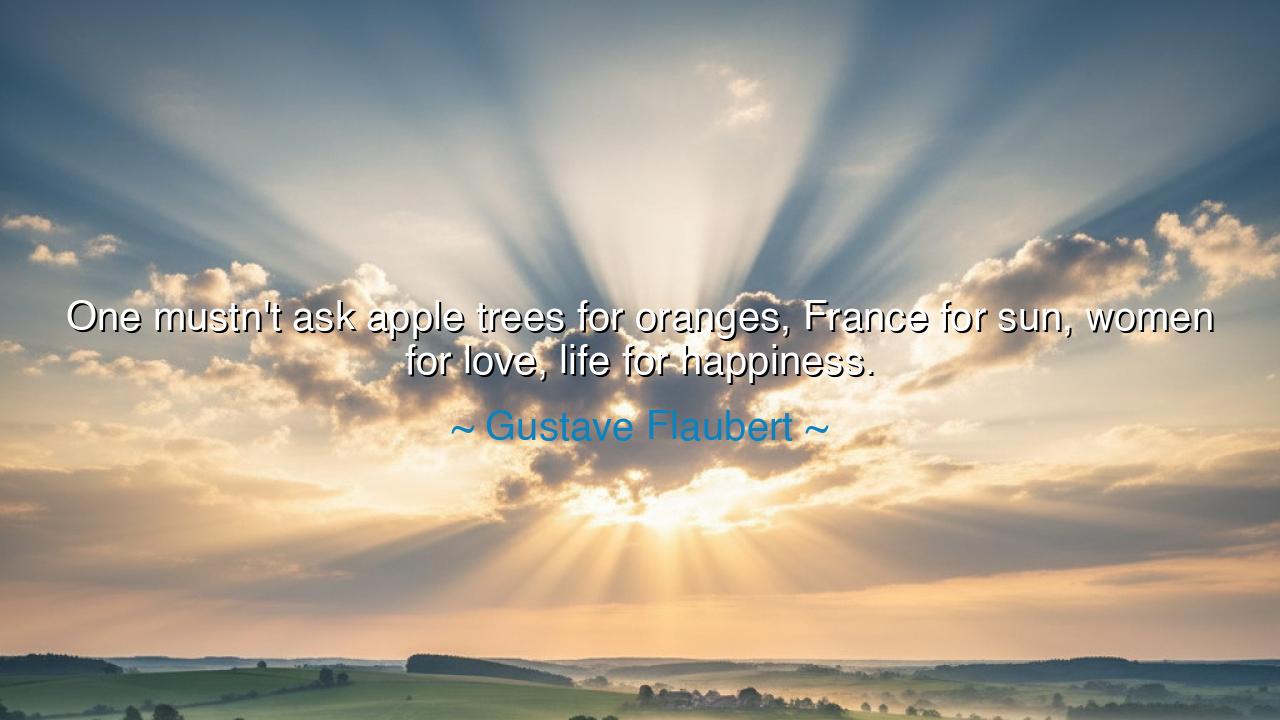
One mustn't ask apple trees for oranges, France for sun, women
One mustn't ask apple trees for oranges, France for sun, women for love, life for happiness.






When Gustave Flaubert wrote, “One mustn't ask apple trees for oranges, France for sun, women for love, life for happiness,” he was not speaking in bitterness, but in wisdom. These words, like fruit ripened by reflection, are the distillation of a truth both ancient and enduring: that disappointment is born not from what the world withholds, but from what we wrongly demand of it. Flaubert, the great realist of French literature, understood that much of human sorrow comes from the refusal to accept things as they are. In this quote, he reminds us that peace lies not in forcing life to yield what it cannot give, but in learning to see beauty in what it already offers.
Flaubert, author of Madame Bovary, lived through the storms of desire and disillusionment that marked the human heart. His art was shaped by a relentless search for truth, for the essence of things stripped of illusion. He saw in people a tragic tendency—to demand from the world what it was never meant to provide. His heroine, Emma Bovary, demanded passion from marriage, grandeur from daily life, and ecstasy from a world made of dust and duty. Her ruin came not from cruelty or fate, but from expectation. And so, through this quote, Flaubert speaks to all who suffer as Emma did: asking apple trees for oranges, asking life for what it cannot give, instead of finding contentment in the gifts already at hand.
The first image in his saying—apple trees and oranges—is more than a metaphor; it is the wisdom of nature itself. The farmer does not curse the soil for bearing what it was born to bear. He tends each tree according to its kind, rejoicing in the fruit it yields in its season. So too must we learn to accept the nature of people and of life. To demand that one thing become another is to live forever in frustration. The wise do not seek to change the essence of the world—they learn to live in harmony with it. In the same way, to ask France for sun—a land known for its mists and melancholy—is to ask the impossible. And yet, within those gray skies lie other beauties: the hush of rain, the quiet of thought, the poetry of shadow.
There is in Flaubert’s words an unspoken invitation—to turn expectation into understanding, and judgment into gratitude. How often do we wound those around us by asking of them what they cannot give? We ask love where there is only friendship, admiration where there is indifference, perfection where there is humanity. We ask of life constant happiness, when it was designed instead to teach, to challenge, to deepen the soul. The ancient Stoics, like Marcus Aurelius, spoke this same truth: “Do not seek for events to happen as you wish, but wish them to happen as they do.” To accept reality is not to surrender—it is to awaken.
Consider the story of Helen Keller, born deaf and blind, living in a silence and darkness most would call unbearable. If life had owed her happiness, she might have perished in despair. But she learned instead to find meaning, to draw joy from the smallest victories—a word learned through touch, a thought expressed through motion. Her happiness came not from demanding what was denied her, but from embracing what she was given. She became a teacher, a writer, a light to the world. Through her life we see Flaubert’s wisdom made flesh: when one ceases to demand oranges from an apple tree, one begins to taste the sweetness of what is already growing there.
Flaubert’s philosophy is not cynicism; it is liberation. To stop demanding from others, from love, from the world, what they cannot give, is to free both them and ourselves. Acceptance is not resignation—it is the highest form of intelligence, the peace that arises from harmony with reality. The man who accepts life as it is may still work to improve it, but he does so without rage or delusion. He plants, waters, and tends, knowing that the soil gives only according to its nature. He becomes not a dreamer lost in longing, but a creator grounded in truth.
So, my children of longing and wisdom, learn from Flaubert this lesson: temper your desires, and you will find freedom. Ask not for the world to be other than it is, but seek to understand and cherish it as it stands. Love people for who they are, not for who you wish them to be. Welcome joy when it comes, but do not curse sorrow when it visits—for both are the seasons of the soul. The secret is not to demand happiness, but to cultivate peace; not to chase perfection, but to live in grace. For the apple tree will never bear oranges—but if you learn to savor its apples, you will discover they are sweet enough to feed the heart forever.






AAdministratorAdministrator
Welcome, honored guests. Please leave a comment, we will respond soon